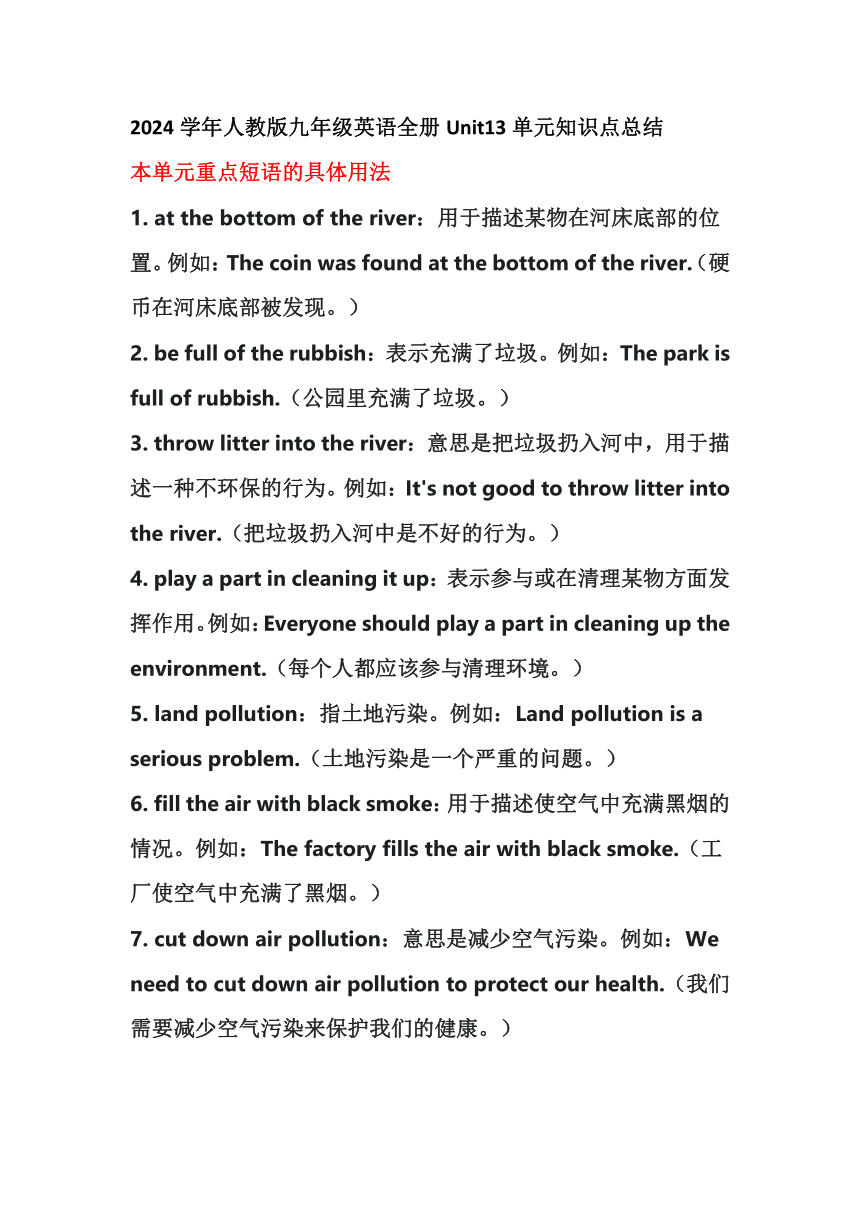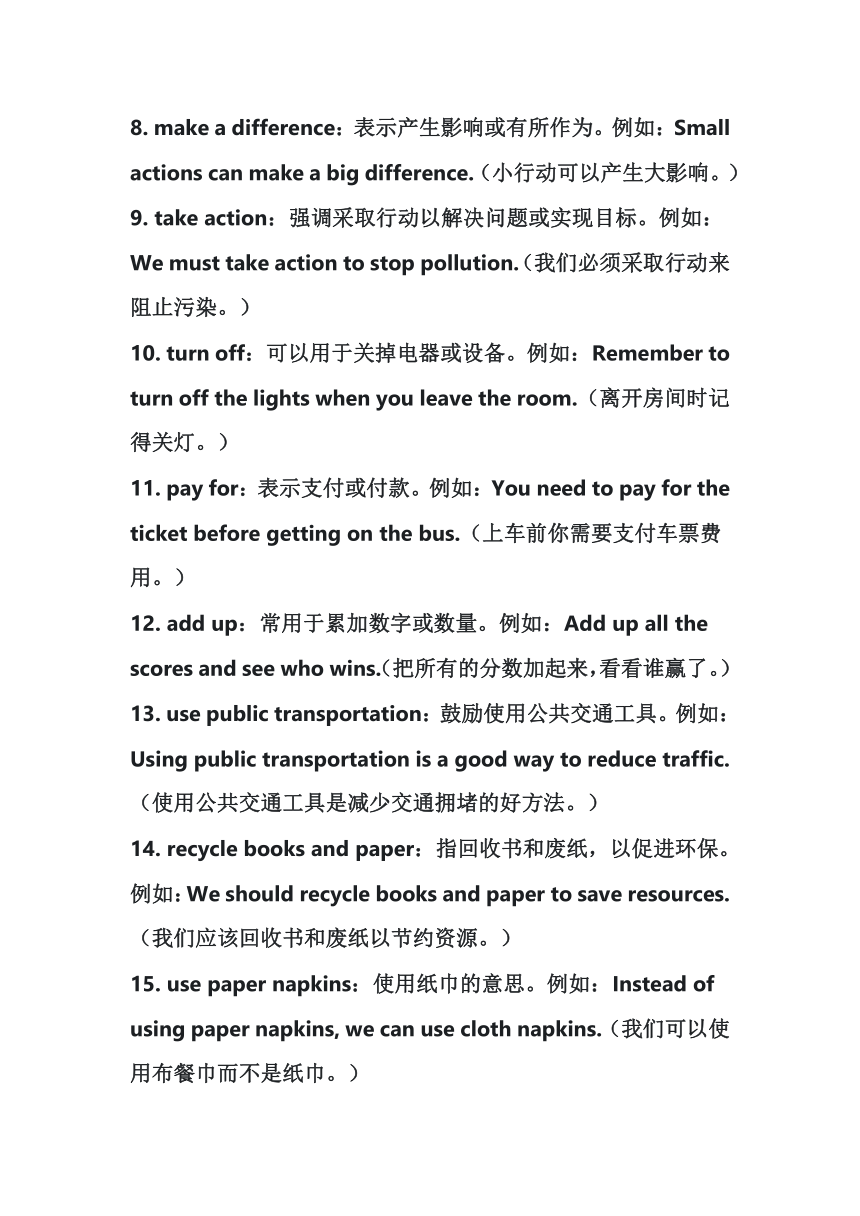Unit 13 We're trying to save the earth!单元知识点总结人教版英语九年级全册
文档属性
| 名称 | Unit 13 We're trying to save the earth!单元知识点总结人教版英语九年级全册 |  | |
| 格式 | docx | ||
| 文件大小 | 22.2KB | ||
| 资源类型 | 教案 | ||
| 版本资源 | 人教新目标(Go for it)版 | ||
| 科目 | 英语 | ||
| 更新时间 | 2024-02-25 20:59:26 | ||
图片预览



文档简介
2024学年人教版九年级英语全册Unit13单元知识点总结
本单元重点短语的具体用法
1. at the bottom of the river:用于描述某物在河床底部的位置。例如:The coin was found at the bottom of the river.(硬币在河床底部被发现。)
2. be full of the rubbish:表示充满了垃圾。例如:The park is full of rubbish.(公园里充满了垃圾。)
3. throw litter into the river:意思是把垃圾扔入河中,用于描述一种不环保的行为。例如:It's not good to throw litter into the river.(把垃圾扔入河中是不好的行为。)
4. play a part in cleaning it up:表示参与或在清理某物方面发挥作用。例如:Everyone should play a part in cleaning up the environment.(每个人都应该参与清理环境。)
5. land pollution:指土地污染。例如:Land pollution is a serious problem.(土地污染是一个严重的问题。)
6. fill the air with black smoke:用于描述使空气中充满黑烟的情况。例如:The factory fills the air with black smoke.(工厂使空气中充满了黑烟。)
7. cut down air pollution:意思是减少空气污染。例如:We need to cut down air pollution to protect our health.(我们需要减少空气污染来保护我们的健康。)
8. make a difference:表示产生影响或有所作为。例如:Small actions can make a big difference.(小行动可以产生大影响。)
9. take action:强调采取行动以解决问题或实现目标。例如:We must take action to stop pollution.(我们必须采取行动来阻止污染。)
10. turn off:可以用于关掉电器或设备。例如:Remember to turn off the lights when you leave the room.(离开房间时记得关灯。)
11. pay for:表示支付或付款。例如:You need to pay for the ticket before getting on the bus.(上车前你需要支付车票费用。)
12. add up:常用于累加数字或数量。例如:Add up all the scores and see who wins.(把所有的分数加起来,看看谁赢了。)
13. use public transportation:鼓励使用公共交通工具。例如:Using public transportation is a good way to reduce traffic.(使用公共交通工具是减少交通拥堵的好方法。)
14. recycle books and paper:指回收书和废纸,以促进环保。例如:We should recycle books and paper to save resources.(我们应该回收书和废纸以节约资源。)
15. use paper napkins:使用纸巾的意思。例如:Instead of using paper napkins, we can use cloth napkins.(我们可以使用布餐巾而不是纸巾。)
16. turn off the shower:关掉喷头,节约用水。例如:Always turn off the shower when you're done.(洗完澡后一定要关掉喷头。)
17. ride in cars:描述开车出行的方式。例如:Too many people ride in cars, which causes traffic jams.(太多人开车出行,导致交通堵塞。)
本单元重点句子
1.Even the bottom of the river was full of rubbish.
即使河底都充满垃圾。
2.Everyone in town should play a part in cleaning it up.
城里的每个人都应当尽一份力把它清理干净。
3.The air is badly polluted because there are too many cars on the road these days.
空气被严重污染因为如今路上的汽车太多了。
4.To cut down air pollution, we should take the bus or subway instead of driving.
为了减少空气污染,我们应当乘坐公汽或地铁而不是开车。
5. I used to be able to see stars in the sky.
我过去能在天空中看到星星。
6. The air has become really polluted around here. I’m getting very worried.
这儿的空气真的已经被污染了,我非常担心。
7. No scientific studies have shown that shark fins are good for health.
没有科学研究说明鱼鳍对人们的健康有好处。
本单元重点知识点讲解
1. pay 的基本用法:
- pay (sb.) money for sth. 付钱(给某人)买……。例如:I paid 20 pounds for this book. 我花了 20 英磅买这本书。
- pay for sth. 付……的钱。例如:I need to pay for the repairs. 我需要支付修理费用。
- pay for sb. 替某人付钱。例如:I'll pay for your meal. 我会替你付餐费。
- pay sb. 付钱给某人。例如:The company pays its employees weekly. 公司每周给员工支付工资。
- pay money back 还钱。例如:I still have to pay back the money I borrowed from you. 我还得还你借给我的钱。
- pay off one's money 还清钱。
2. not only…but also…的具体用法:
- not only…but also…意为“不仅……而且……”,用于连接两个表示并列关系的成分,强调后者。例如:This movie is not only interesting, but also educational. 这部电影不仅有趣,而且有教育意义。
- 当连接两个成分作主语时,谓语通常与靠近的主语保持一致。例如:Not only the students but also the teacher is excited. 不仅学生们激动,老师也很激动。
- 若连接两个句子,not only 后面的句子要用倒装。例如:Not only did she win the race, but she also set a new record. 她不仅赢得了比赛,还创造了新的纪录。
本单元重点语法讲解
动词不定式做目的状语时的用法:
动词不定式(To do)可以用来作目的状语,通常放在句子的开头或结尾,以表明某个动作或行为的目的。以下是一些常见的用法示例:
1. 放在句首:To pass the exam, I need to study hard.(为了通过考试,我需要努力学习。)
2. 放在句尾:I went to the store to buy some food.(我去商店买一些食物。)
3. 与 in order to 连用:In order to achieve my goal, I will work extra hard.(为了实现我的目标,我会更加努力工作。)
4. 与 so as to 连用:She spoke loudly so as to be heard.(她大声说话以便被听到。)
作文训练
典型例题
假如你所在的城市正在创建“国家级卫生城市”, 作为该城市的一员, 你会有许多感触和想法。请以“How to set up a national healthy city ”为题, 根据所给提示写一篇80-100个单词的英语短文。
优秀范文
How to set up a national healthy city Our city is trying to set up a national healthy city. As a member of the city, I think we should obey the rules. We can’t throw rubbish here and there. We can’t talk loudly in public, such as in the library or in the museum. We can’t spit and smoke in public as well. When we are on the bus, we should give our seats to the old and children, as well as some women with babies in their arms. During our daily lives, we should be polite to others. And we should obey the traffic rules. Remember to stop when the traffic light is red. We must go across the road when the traffic light is green. Finally, we should also turn off the lights before we leave the room.I’m sure our city will become more and more beautiful as long as we all try our best to do something for it!
本单元重点短语的具体用法
1. at the bottom of the river:用于描述某物在河床底部的位置。例如:The coin was found at the bottom of the river.(硬币在河床底部被发现。)
2. be full of the rubbish:表示充满了垃圾。例如:The park is full of rubbish.(公园里充满了垃圾。)
3. throw litter into the river:意思是把垃圾扔入河中,用于描述一种不环保的行为。例如:It's not good to throw litter into the river.(把垃圾扔入河中是不好的行为。)
4. play a part in cleaning it up:表示参与或在清理某物方面发挥作用。例如:Everyone should play a part in cleaning up the environment.(每个人都应该参与清理环境。)
5. land pollution:指土地污染。例如:Land pollution is a serious problem.(土地污染是一个严重的问题。)
6. fill the air with black smoke:用于描述使空气中充满黑烟的情况。例如:The factory fills the air with black smoke.(工厂使空气中充满了黑烟。)
7. cut down air pollution:意思是减少空气污染。例如:We need to cut down air pollution to protect our health.(我们需要减少空气污染来保护我们的健康。)
8. make a difference:表示产生影响或有所作为。例如:Small actions can make a big difference.(小行动可以产生大影响。)
9. take action:强调采取行动以解决问题或实现目标。例如:We must take action to stop pollution.(我们必须采取行动来阻止污染。)
10. turn off:可以用于关掉电器或设备。例如:Remember to turn off the lights when you leave the room.(离开房间时记得关灯。)
11. pay for:表示支付或付款。例如:You need to pay for the ticket before getting on the bus.(上车前你需要支付车票费用。)
12. add up:常用于累加数字或数量。例如:Add up all the scores and see who wins.(把所有的分数加起来,看看谁赢了。)
13. use public transportation:鼓励使用公共交通工具。例如:Using public transportation is a good way to reduce traffic.(使用公共交通工具是减少交通拥堵的好方法。)
14. recycle books and paper:指回收书和废纸,以促进环保。例如:We should recycle books and paper to save resources.(我们应该回收书和废纸以节约资源。)
15. use paper napkins:使用纸巾的意思。例如:Instead of using paper napkins, we can use cloth napkins.(我们可以使用布餐巾而不是纸巾。)
16. turn off the shower:关掉喷头,节约用水。例如:Always turn off the shower when you're done.(洗完澡后一定要关掉喷头。)
17. ride in cars:描述开车出行的方式。例如:Too many people ride in cars, which causes traffic jams.(太多人开车出行,导致交通堵塞。)
本单元重点句子
1.Even the bottom of the river was full of rubbish.
即使河底都充满垃圾。
2.Everyone in town should play a part in cleaning it up.
城里的每个人都应当尽一份力把它清理干净。
3.The air is badly polluted because there are too many cars on the road these days.
空气被严重污染因为如今路上的汽车太多了。
4.To cut down air pollution, we should take the bus or subway instead of driving.
为了减少空气污染,我们应当乘坐公汽或地铁而不是开车。
5. I used to be able to see stars in the sky.
我过去能在天空中看到星星。
6. The air has become really polluted around here. I’m getting very worried.
这儿的空气真的已经被污染了,我非常担心。
7. No scientific studies have shown that shark fins are good for health.
没有科学研究说明鱼鳍对人们的健康有好处。
本单元重点知识点讲解
1. pay 的基本用法:
- pay (sb.) money for sth. 付钱(给某人)买……。例如:I paid 20 pounds for this book. 我花了 20 英磅买这本书。
- pay for sth. 付……的钱。例如:I need to pay for the repairs. 我需要支付修理费用。
- pay for sb. 替某人付钱。例如:I'll pay for your meal. 我会替你付餐费。
- pay sb. 付钱给某人。例如:The company pays its employees weekly. 公司每周给员工支付工资。
- pay money back 还钱。例如:I still have to pay back the money I borrowed from you. 我还得还你借给我的钱。
- pay off one's money 还清钱。
2. not only…but also…的具体用法:
- not only…but also…意为“不仅……而且……”,用于连接两个表示并列关系的成分,强调后者。例如:This movie is not only interesting, but also educational. 这部电影不仅有趣,而且有教育意义。
- 当连接两个成分作主语时,谓语通常与靠近的主语保持一致。例如:Not only the students but also the teacher is excited. 不仅学生们激动,老师也很激动。
- 若连接两个句子,not only 后面的句子要用倒装。例如:Not only did she win the race, but she also set a new record. 她不仅赢得了比赛,还创造了新的纪录。
本单元重点语法讲解
动词不定式做目的状语时的用法:
动词不定式(To do)可以用来作目的状语,通常放在句子的开头或结尾,以表明某个动作或行为的目的。以下是一些常见的用法示例:
1. 放在句首:To pass the exam, I need to study hard.(为了通过考试,我需要努力学习。)
2. 放在句尾:I went to the store to buy some food.(我去商店买一些食物。)
3. 与 in order to 连用:In order to achieve my goal, I will work extra hard.(为了实现我的目标,我会更加努力工作。)
4. 与 so as to 连用:She spoke loudly so as to be heard.(她大声说话以便被听到。)
作文训练
典型例题
假如你所在的城市正在创建“国家级卫生城市”, 作为该城市的一员, 你会有许多感触和想法。请以“How to set up a national healthy city ”为题, 根据所给提示写一篇80-100个单词的英语短文。
优秀范文
How to set up a national healthy city Our city is trying to set up a national healthy city. As a member of the city, I think we should obey the rules. We can’t throw rubbish here and there. We can’t talk loudly in public, such as in the library or in the museum. We can’t spit and smoke in public as well. When we are on the bus, we should give our seats to the old and children, as well as some women with babies in their arms. During our daily lives, we should be polite to others. And we should obey the traffic rules. Remember to stop when the traffic light is red. We must go across the road when the traffic light is green. Finally, we should also turn off the lights before we leave the room.I’m sure our city will become more and more beautiful as long as we all try our best to do something for it!
同课章节目录
- Unit 1 How can we become good learners.
- Section A
- Section B
- Unit 2 I think that mooncakes are delicious!
- Section A
- Section B
- Unit 3 Could you please tell me where the restroom
- Section A
- Section B
- Unit 4 I used to be afraid of the dark.
- Section A
- Section B
- Unit 5 What are the shirts made of?
- Section A
- Section B
- Review of Units 1-5
- Unit 6 When was it invented?
- Section A
- Section B
- Unit 7 Teenagers should be allowed to choose their
- Section A
- Section B
- Unit 8 It must belong to Carla.
- Section A
- Section B
- Unit 9 I like music that I can dance to.
- Section A
- Section B
- Unit 10 You're supposed to shake hands.
- Section A
- Section B
- Review of Units 6-10
- Unit 11 Sad movies make me cry.
- Section A
- Section B
- Unit 12 Life is full of the unexpected
- Section A
- Section B
- Unit 13 We're trying to save the earth!
- Section A
- Section B
- Unit 14 I remember meeting all of you in Grade 7.
- Section A
- Section B
- Review of Units 11-14
